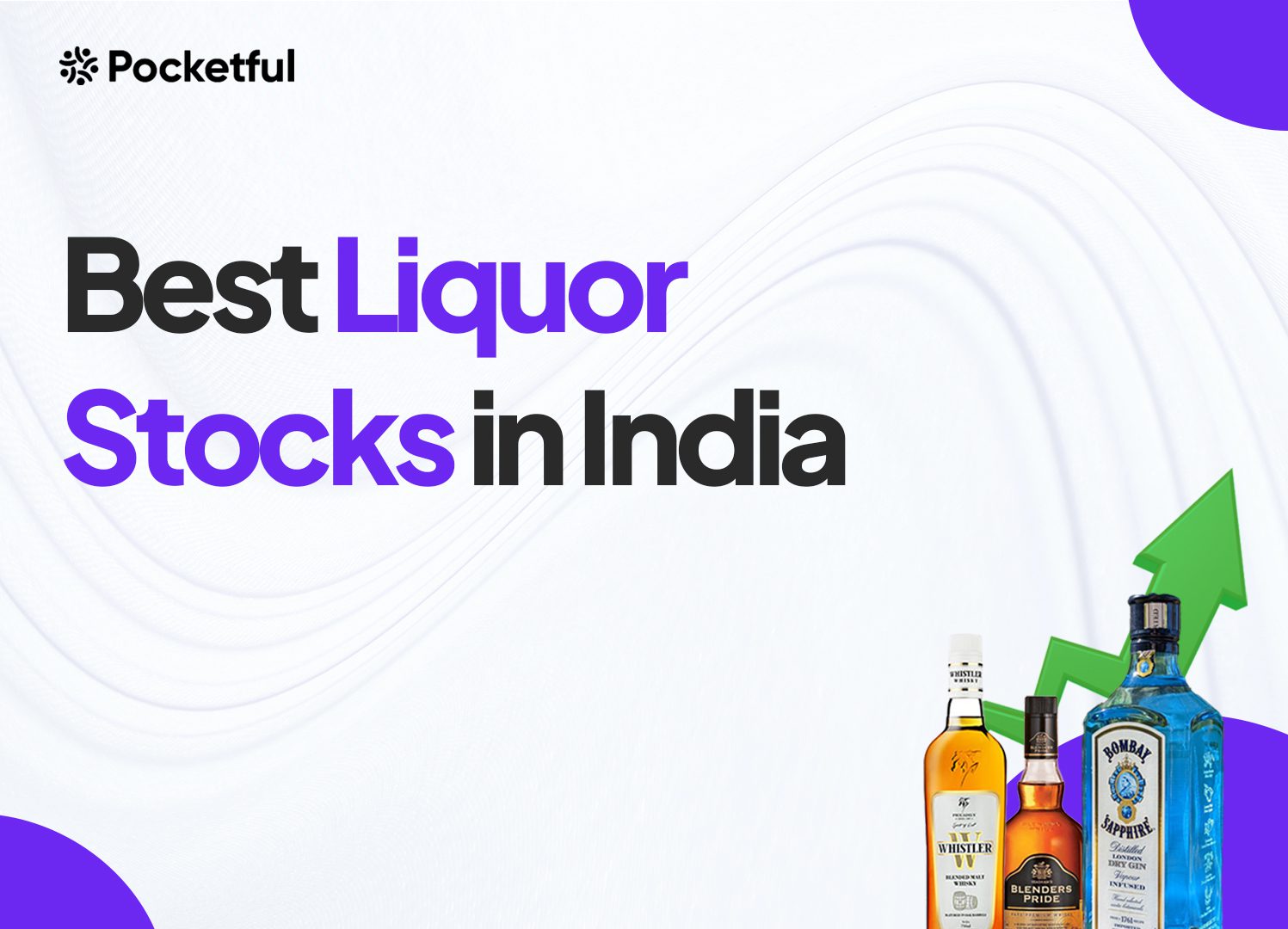| Type | Description | Contributor | Date |
|---|---|---|---|
| Post created | Pocketful Team | Aug-08-24 | |
| Add internal links | Nisha | Feb-15-25 | |
| Add internal links | Nisha | Feb-15-25 |
Read Next
- Rakesh Jhunjhunwala Portfolio 2025: Top Holdings & Strategy
- BankBeES vs Bank Nifty – Key Differences
- Current Ratio vs Quick Ratio Key Differences
- Best REIT Stocks in India 2025
- Best Data Center Stocks in India 2025
- Best Rare Earth Stocks in India
- Top 10 investment banks in India
- What Is iNAV in ETFs?
- Best Investment Options in India 2025
- Best Energy ETFs in India 2025
- Radhakishan Damani Portfolio 2025: Stocks & Strategy Insights
- Best SEBI Registered Brokers in India
- Best Air Purifier Stocks in India
- Best Space Sector Stocks in India
- Gold Rate Prediction for Next 5 Years in India (2026–2030)
- Difference Between Equity Share and Preference Share
- Vijay Kedia Portfolio 2025: Latest Holdings, Strategy & Analysis
- Raj Kumar Lohia Portfolio 2025: Holdings, Strategy & Analysis
- How to Earn Passive Income Through Dividend-Paying Stocks in India
- Top 10 Richest Investors in the World 2025 – Net Worth, Key Investments & Strategies
- Blog
- best liquor stocks in india
List of Best Liquor Stocks in India

From ancient civilizations to modern-day cocktail culture, alcohol has played an important role in human history. From humble beginnings to global conglomerates, the industry has evolved into a complex interaction of culture, commerce, and consumer desire. Behind the fancy bottles and sophisticated marketing, there are many opportunities and challenges.
In this blog, we will discuss the best liquor stocks in India that an investor can watch out for, their recent returns, and how the liquor industry is poised for growth in the future.
Overview of the Liquor Industry in India

India’s liquor industry is valued at $ 55,840 million in 2024. Alcoholic beverage sales in the country are expected to increase by 7.2% annually, reaching US $ 112,338.9 million by 2034. Indian-Made Foreign Liquor dominates the market with a 69% share, with whiskey, rum, and brandy being the most popular categories. It is a highly regulated industry with heavy tax burdens. The sector comprises a mix of large multinational corporations, domestic giants, and regional players.
Top Liquor Stocks Based on Market Capitalisation
The top liquor stocks in India are:
| S.No. | Liquor Stocks |
|---|---|
| 1 | United Spirits Ltd. |
| 2 | United Breweries Ltd. |
| 3 | Radico Khaitan Ltd. |
| 4 | Allied Blenders & Distillers Ltd. |
| 5 | Tilaknagar Industries Ltd. |
The top liquor stocks have been listed in descending order based on their market capitalization in the table below,
| Company | Market Cap (in INR crore) | CMP (in INR) | 52-Week High | 52-Week Low |
|---|---|---|---|---|
| United Spirits Ltd. | 1,06,266 | 1,461 | 1,466 | 976 |
| United Breweries Ltd. | 52,211 | 1,975 | 2,182 | 1,492 |
| Radico Khaitan Ltd. | 22,429 | 1,677 | 1,885 | 1,141 |
| Allied Blenders & Distillers Ltd. | 8,268 | 296 | 348 | 282 |
| Tilaknagar Industries Ltd. | 4,658 | 242 | 291 | 171 |
Read Also: List of Top 10 Blue Chip Stocks in India with Price
Top 5 Liquor Stocks Based on Market Capitalisation – An Overview
1. United Spirits Ltd.
United Spirits Ltd., or USL, is a titan of the Indian alcoholic beverages industry. It started in 1826 as a trading company named McDowell & Company. The company initially imported liquor, tobacco, and other goods for the Britishers living in India. Over time, the company changed and evolved. In 1962, McDowell launched its first product, Golden Grape Brandy. In 2013, Diageo, a global leader in alcoholic beverages, acquired a majority stake in USL. This partnership has brought global expertise and resources to improve the company’s operations. Today, the company has a strong presence in both domestic and international markets, exporting its products to over 37 countries. The product portfolio of United Spirits consists of 140 liquor brands.
Know the Returns:
| 1Y Return (%) | 3Y Return (%) | 5Y Return (%) |
|---|---|---|
| 20.21% | 66.39% | 93.90% |
2. United Breweries Ltd.
The company was established in 1915 with five breweries in South India. The company was bought by the late Mr Vittal Mallya in 1947. Since then, it has consistently grown and never looked back. United Breweries products sell at more than 85,000 outlets across India. The company’s headquarters is situated in Bangalore. It owns numerous iconic brands like Kingfisher, McDowell, Royal Stag, etc.
Know the Returns:
| 1Y Return (%) | 3Y Return (%) | 5Y Return (%) |
|---|---|---|
| 17.68% | 33.62% | 58.19% |
3. Radico Khaitan Ltd.
Radico Khaitan is a top Indian manufacturer of Indian-Made-Foreign-Liquor (IMFL). Radico Khaitan was founded in 1943 as Rampur Distillery & Chemical Company Limited. It has become a major bulk spirits supplier and bottler and has over fifteen organically grown brands. Khaitan’s portfolio includes a wide range of IMFL products such as 8 PM, Magic Moments, Old Monk, etc. Radico Khaitan is the fourth largest company in India, with a strong presence in North India, and exports its products to over 85 countries. Radico Khaitan also created an international division, namely Radico International, in 2003 and introduced brands such as Beck’s Beer and wines from E&J Gallo to the Indian alcohol market.
Know the Returns:
| 1Y Return (%) | 3Y Return (%) | 5Y Return (%) |
|---|---|---|
| 18.64% | 124.15% | 381.93% |
4. Allied Blenders & Distillers Ltd.
Allied Blenders & Distillers is a well-known Indian liquor company based in Mumbai. It is a key player in the alcohol industry, distributing a wide range of products, including whiskey, rum, vodka, brandy, and other spirits. The company holds a strong global presence, exporting its products to over 22 countries. It was founded in 1988 by Kishore Rajaram Chhabria. He was the former Managing Director of Shaw Wallace, saw a chance to bring back lesser-known alcohol brands, started a new business in Delhi, and launched a new whiskey brand.
The company’s core focus is on producing, marketing, and distributing a wide range of alcoholic beverages. Allied Blenders & Distillers has a strong distribution network that ensures its products reach a wide audience.
Know the Returns:
| 1Y Return (%) | 3Y Return (%) | 5Y Return (%) |
|---|---|---|
| 2.20% | 2.20% | 2.20% |
5. Tilaknagar Industries Ltd.
Tilaknagar Industries is a prominent Indian liquor company that is well-recognized for its assorted portfolio of IMFL and extra-neutral alcohol (ENA). The company was established in 1933 by Shri Mahadev L Dahanukar as ‘The Maharashtra Sugar Mills Limited.’ Tilaknagar Industries offers a wide range of products, such as brandy, whiskey, vodka, gin, rum, etc. The company has a strong distribution network, and its products are exported to international markets.
Know the Returns:
| 1Y Return (%) | 3Y Return (%) | 5Y Return (%) |
|---|---|---|
| 6.60% | 260.88% | 1,242.33% |
Top Liquor Stocks in India Based on 1-Year Return
The liquor stocks have been listed in descending order based on their 1-year returns in the table below:
| Company | 1-Year Returns (in %) |
|---|---|
| Winsome Breweries Ltd. | 438.65% |
| Ravi Kumar Distilleries Ltd. | 201.15% |
| GM Breweries Ltd. | 69.64% |
| Associated Alcohols and Breweries Ltd. | 69.23% |
| Tilaknagar Industries Ltd. | 40.85% |
Winsome Breweries Ltd.
Winsome Breweries is an Indian company that operates in the brewing industry. It was established in June 1992 by R.K. Bagrodia as a joint venture between India and Germany, specifically with Henniger Brau, Germany. It started selling beer in January 1997 with a yearly capacity of 10,000 kilolitres annually. Indigenous brands German Thunder and Limo Lemon were introduced in 1997-98. The company’s primary focus is on manufacturing and distributing beer. It has a strong distribution network that reaches consumers across India. The plant of WBL is situated in Village Sarehkhurd, Tehsil Tijara, District Alwar, Rajasthan, with an installed capacity of 3,00,000 HL per annum. There are plans to double its capacity shortly.
Know the Returns:
| 1Y Return (%) | 3Y Return (%) | 5Y Return (%) |
|---|---|---|
| 66.75% | 203.79% | 854.05% |
Ravi Kumar Distilleries Ltd.
Ravi Kumar Distilleries Limited is an Indian company involved in the manufacturing and sale of Indian-made foreign liquor (IMFL). It was established in 1993 with its manufacturing unit in Puducherry, India. They have a mix of their brands and products manufactured under tie-up arrangements with other liquor companies. Some of their famous brands include Capricorn, Green Magic Brandy, Chevalier, and Oncemore. The state-of-the-art plant is constructed to meet international standards and is operated by a skilled workforce with the highest standards of safety and hygiene.
Know the Returns:
| 1Y Return (%) | 3Y Return (%) | 5Y Return (%) |
|---|---|---|
| 14.47% | 194.73% | 272.88% |
Associated Alcohols and Breweries Ltd.
The company has a strong presence in the IMFL (Indian Made Foreign Liquor) segment and also sells popular beer brands. Associated Alcohol’s focus on quality and innovation has contributed to its success in a competitive market. It was founded in 1989 by Shri Bhagwati Prasad Kedia. It has grown a lot since then under the leadership of his sons, Anand Kedia and Prasann Kedia. AABL specializes in manufacturing Extra Neutral Alcohol (ENA), rectified spirit, IMFL, and country liquor. Their advanced manufacturing facility is located in Central India, close to Indore, in Madhya Pradesh.
Know the Returns:
| 1Y Return (%) | 3Y Return (%) | 5Y Return (%) |
|---|---|---|
| 145.07% | 153.96% | 306.41% |
GM Breweries Ltd.
G M Breweries Limited is a well-known company in India that makes and sells Country Liquor and Indian-made foreign liquor (IMFL). Founded in 1981 by Shri Jimmy William Almeida, the company has grown to become the largest manufacturer of country liquor in Maharashtra, holding a significant market share. It maintains a good distribution network to reach a wide customer base.
Know the Returns:
| 1Y Return (%) | 3Y Return (%) | 5Y Return (%) |
|---|---|---|
| 32.53% | 33.15% | 89.74% |
Key Performance Indicators (KPIs)
| Company | ROE (%) | ROCE (%) | Debt-to-Equity | P/E (x) | P/B (x) |
|---|---|---|---|---|---|
| United Spirits Ltd. | 19.77 | 26.55 | 0 | 75.11 | 14.92 |
| United Breweries Ltd. | 9.81 | 13.21 | 0.02 | 116.16 | 12.44 |
| Radico Khaitan Ltd. | 10.74 | 13.91 | 0.3 | 88.5 | 9.46 |
| Allied Blenders & Distillers Ltd. | 0.44 | 30.3 | 2.03 | – | 19.48 |
| Tilaknagar Industries Ltd. | 21.1 | 21.55 | 0.18 | 33.74 | 7.13 |
| Winsome Breweries Ltd. | 1.67 | 2.03 | 0.27 | – | – |
| Ravi Kumar Distilleries Ltd. | -4.65 | 0.46 | 0.95 | 370 | 1.93 |
| Associated Alcohols and Breweries Ltd. | 18.22 | 21.35 | 0.57 | 25.28 | 3.44 |
| GM Breweries Ltd. | 18.42 | 22.03 | 0 | 11.38 | 2.17 |
Read Also: Top Alcohol Stocks In India
Benefits of Investing in Liquor Stocks
The benefits of investing in liquor stocks are:
- Steady Demand – The demand for liquor tends to remain relatively stable, even during economic downturns, which can eventually lead to consistent revenue generation for liquor companies.
- High-Profit Margins – The liquor industry often has high-profit margins, which can translate into strong share price returns.
- Growth potential – With increasing disposable income and changing lifestyles, the demand for liquor in India and many other countries is growing. The continuous shift towards premium and luxury brands can drive growth and profitability.
- Diversification – Adding liquor stocks to your portfolio can help reduce overall risk because the liquor industry often performs differently from other sectors and provides a hedge against market swings.
Factors to Consider Before Investing in Liquor Stocks

An investor must consider the following factors before investing in liquor stocks:
- Inflation – Rising inflation can increase the production cost of alcohol companies, squeezing their profit margins and stock prices.
- Taxation & pricing – Liquor stocks are sensitive to changes in taxation policy. Higher taxes can lead to increased costs for companies and can discourage consumption.
- Economic Growth – Strong economic growth results in increased disposable income in the hands of consumers and leads to a rise in spending on discretionary items like alcohol.
- Regulatory Procedures – Complex licensing & regulatory procedures can be a hurdle for liquor companies, thereby increasing operational costs and negatively affecting their profitability.
- Consumer Trends – People trying to adopt a healthy lifestyle can also affect the sales of liquor. Companies need to adapt to the evolving trends of consumers and produce accordingly.
Future of the Liquor Industry
The liquor industry is expected to undergo substantial changes in the coming years, prompted by factors such as consumer preferences and regulatory changes. Consumers are willing to pay more for high-quality alcohol products. This trend is driving the growth in premium segments. Growing health consciousness is giving rise to low-alcohol and non-alcoholic options. Online platforms are gaining traction, offering new distribution channels and opportunities for direct consumer engagement. Companies that can differentiate themselves through unique flavors and a focus on craftsmanship are well-positioned to sustain in this evolving market.
Read Also: Best Alcohol Penny Stocks in India
Conclusion
The liquor industry is complicated and constantly changing, affected by multiple factors. The liquor industry faces both opportunities and challenges. The demand for liquor is steady, and profit margins are high, which makes it a sector to look out for. Liquor companies must prioritize strong brand building, understanding consumer needs, and adapting to market changes for success. Embracing these shifts in consumer preferences and market dynamics will be essential for long-term success in the industry. However, it is advised to consult a financial advisor before investing.
Frequently Asked Questions (FAQs)
What is the main difference between spirits and liquor?
Spirits are distilled alcoholic beverages, while liquor is a broader term, including spirits, wines, and beers.
Which country produces the most liquor?
China is currently the largest producer of liquor in the world.
Which companies manufacture liquor in India?
United Spirits Ltd., United Breweries Ltd., and Tilaknagar Industries Ltd. are prominent liquor companies in India.
Is investing in liquor stocks a good option?
It can be a good option, but similar to any other investment, it involves risks. Brand loyalty, market share, and economic trends should be considered before investing in liquor stocks.
How do government regulations impact the liquor industry?
Government regulations affect production, distribution, advertising, and taxation, which directly impacts the company’s profitability.
Disclaimer
The securities, funds, and strategies discussed in this blog are provided for informational purposes only. They do not represent endorsements or recommendations. Investors should conduct their own research and seek professional advice before making any investment decisions.
Article History
Table of Contents
Toggle